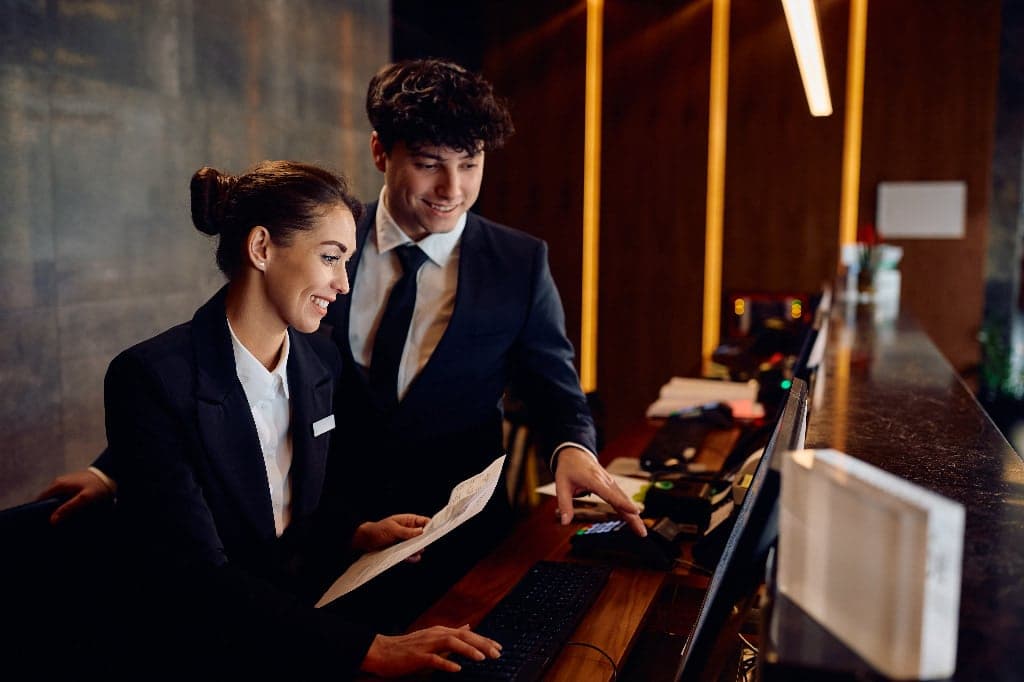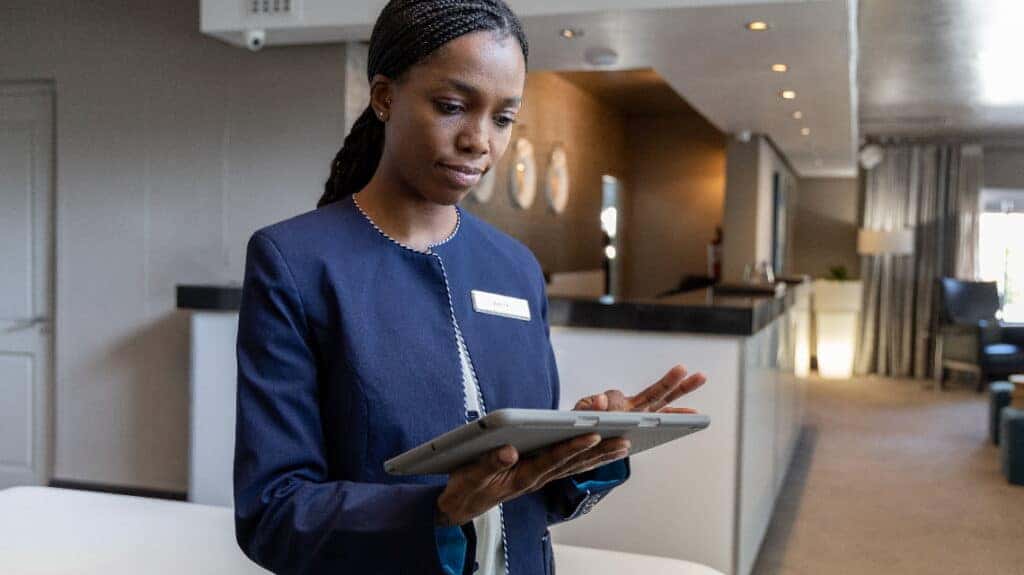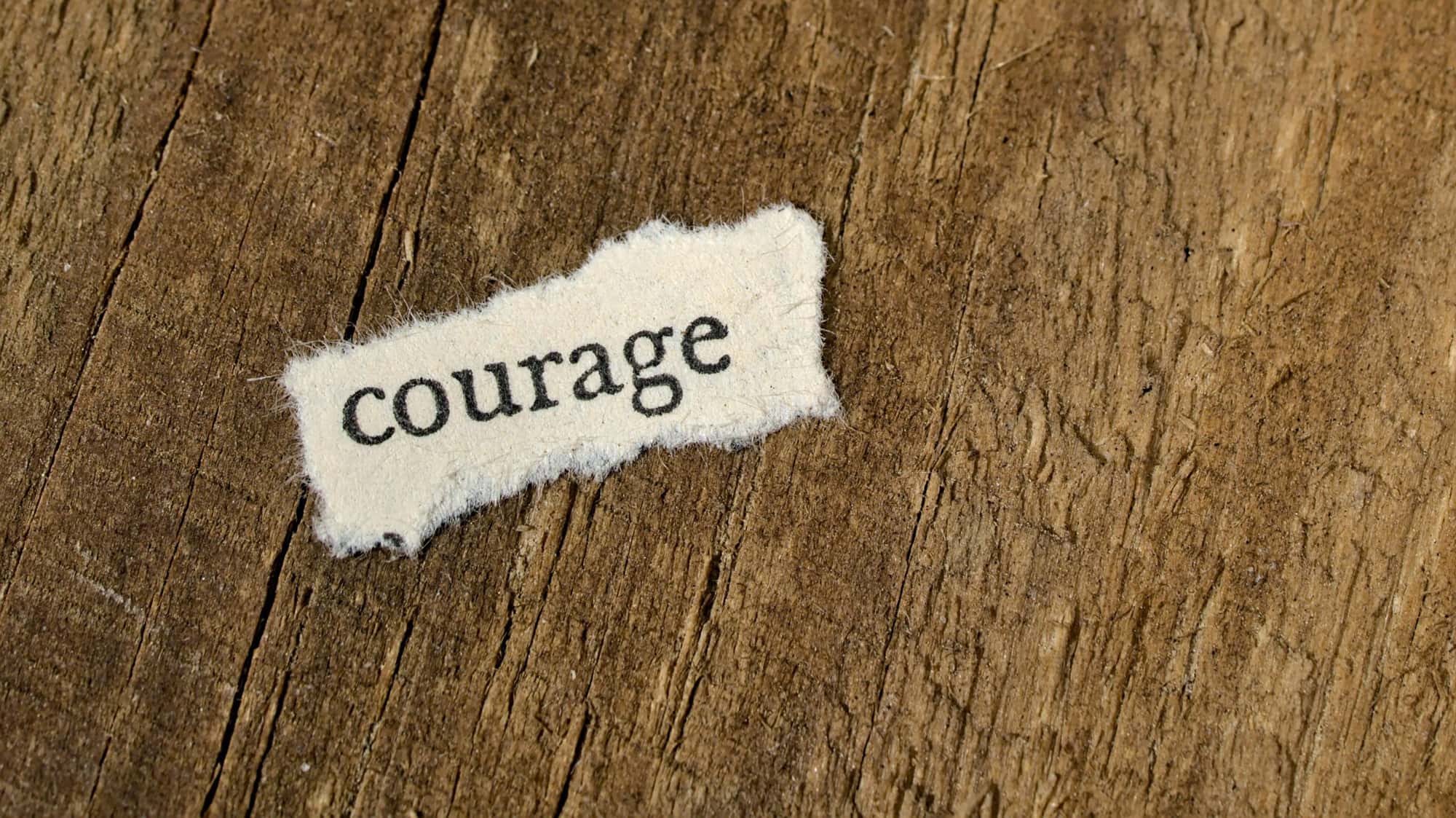The hotel industry is worth more than $400 billion USD globally – and all this money has to be managed. While guests immerse themselves in the comforts and experiences of a hotel stay, hotel auditors work diligently behind the scenes, handling spreadsheets, reconciling accounts and scrutinizing figures. Beyond the glitz and glamor of the lobby, their role ensures every penny is accounted for and every financial transaction is handled with the highest standards of accuracy and transparency. Join us as we look into hotel auditing and how to pursue it as a career.
What does a hotel auditor do?
The role of auditor encompasses a wide range of duties essential for the smooth operation of the hotel. Some of their main functions include:
- Overseeing financial activities: reviewing revenue statements, expense reports and transaction logs to ensure accuracy and making sure staff are following financial protocols. This work includes tracking income streams from room bookings, food and beverage sales, event rentals and other sources, cross-referencing them with corresponding expenses
- Internal controls: developing, implementing and monitoring checks to reduce the risk of fraud, error or mismanagement. This includes establishing procedures for cash handling, inventory management and expenditure approval, safeguarding the hotel’s assets and minimizing financial vulnerabilities
- Compliance management: auditors must stay informed of legislative changes, industry guidelines and best practices to ensure compliance with legal and regulatory requirements. This includes everything from tax regulations to labor laws
- Financial analysis: by identifying trends, anomalies and performance indicators, auditors guide management, informing strategic decision making and resource allocation. This involves optimizing pricing strategies, identifying cost-saving opportunities or evaluating the profitability of specific services
- Risk assessment: anticipating and mitigating financial risks is an integral aspect of the hotel auditor’s role. They conduct risk assessments to identify vulnerabilities in the hotel’s financial processes, assessing factors such as revenue volatility, market fluctuations and operational dependencies
What does a hotel night auditor do?
Many hotel businesses also employ night auditors. This involves carrying out duties similar to those listed above,managing finances for the overnight shift. It is usually a more junior position because the night shift is quieter and there are fewer auditing jobs to do. Some of their key responsibilities include:
- Financial management: reconciling accounts, posting charges and checking guest payments and preparing daily financial reports for the hotel management
- Administrative tasks: night auditors may perform various extra tasks such as answering guest inquiries, processing reservations and preparing paperwork for the following day’s operations
- End-of-day procedures: finalizing the day’s transactions and financial reports and preparing everything for the next day. This may involve generating reports, updating databases and ensuring all systems are properly set up for the morning staff
Which departments work closely with hotel auditors?
Collaboration is crucial for success and hotel auditors have to work with various departments. Their role is relevant throughout the whole business and they often work alongside sectors such as:
- Front office and reservations: hotel auditors closely interact with front desk staff to check room occupancy data, analyze revenue from room bookings and verify guest charges
- Food and beverage: dining services are a significant revenue stream for many hotels. By checking sales reports, inventory records and supplier invoices, auditors contribute to menu pricing, inventory management and cost control initiatives
- Operations and housekeeping: checking expenses related to maintenance, housekeeping supplies and utilities. This means auditors can assess the efficiency of housekeeping operations and identify opportunities for cost-saving measures and process improvements
- Revenue management: by checking data and occupancy trends, auditors can provide valuable insights that inform revenue optimization strategies, helping the hotel achieve high profits while also staying competitive in their pricing
Becoming a hotel auditor
If you aspire to this role, you will need a combination of academic qualifications and practical experience. There are also a lot of skills that are needed to succeed as an auditor. You should aim to get all the education experience and skills listed below if you want to chase this career.
Educational background
While specific educational requirements may vary depending on the employer and the level of seniority, it helps aspiring hotel auditors if they pursue degrees in accounting, finance, hospitality management or a related field. Many auditor roles will require a bachelor’s degree, although some employers may prefer candidates with a master’s degree, especially for senior or specialized roles. If you only have a high school diploma, you will need experience in similar roles to progress in this field.
Those taking a degree program will gain a solid foundation in hotel auditing through relevant coursework based on accounting principles, financial management, auditing and hospitality operations. Courses or training programs focusing on hotel management, revenue management and hospitality law can also offer valuable insights into the unique challenges of the hospitality industry.
Boost your career and become an expert hotel auditor
Whether you want to rise through the ranks or change career, our MBA program can help you become a hotel auditor

Experience
Internships, part-time positions or practical experience in hotel operations, finance and accounting can also improve an applicant’s chances of success. Gaining exposure to the intricacies of hotel financial management and operations is important. Internships can often be accessed through a degree program, but it is possible to find them by contacting businesses directly. There are also specific roles that can help you prepare, with many auditors starting as night auditors or accounting assistants in larger hotels.
Essential skills and competencies
While technical expertise and academic qualifications are essential, building soft skills is equally vital for success. It is important to develop aptitudes such as:
- Analytical skills: the ability to interpret complex financial information and make informed decisions is essential for ensuring accuracy and effectiveness in auditing processes
- Attention to detail: meticulously reviewing financial records, transactional data and operational reports to identify discrepancies, errors or irregularities that may require further investigation
- Communication skills: conveying audit findings, recommendations and insights to senior management, department heads and external auditors. Clear and concise communication also helps collaboration and ensures successful working across different departments
- Customer service skills: useful for when an auditor has to deal with important guests or investors directly
- Problem-solving abilities: this enables auditors to assess situations, explore alternative solutions and implement effective resolutions in a timely manner
Ethical integrity: given their responsibility for safeguarding financial assets, ethics are essential. Demonstrating honesty, objectivity and professional integrity builds trust and credibility

Challenges faced by hotel auditors and how to overcome them
From reconciling disparate data sources to addressing evolving regulatory requirements, hotel auditors encounter a range of challenges. Let’s look at some of the more common ones they have to handle.
Data accuracy and integrity
This is particularly a problem where data is sourced from multiple systems or departments. Discrepancies, errors or inconsistencies in data can complicate auditing processes and undermine confidence in financial reporting.As a solution, auditors need to implement robust data validation to verify the accuracy and consistency of financial data. They can also use automated tools and software solutions to streamline data collection, validation and aggregation processes, reducing the risk of manual errors and improving data integrity.
Compliance with regulatory requirements
The hospitality industry has many regulatory requirements, including tax regulations, labor laws and industry standards. Keeping abreast of regulatory changes and ensuring compliance can be challenging for hotel auditors, especially in multinational businesses.To handle this, they need to establish a robust compliance framework that includes regular assessments of regulatory requirements, updates to policies and procedures and employee training. Technology such as compliance management software can help automate this and track regulatory changes. Auditors also engage with legal counsel, industry associations and regulatory bodies to stay informed about legislative developments and best practices in compliance management.
Fraud detection and prevention
This is a constant concern for hotel auditors, given the potential for financial losses, reputational damage and legal liabilities. Fraud schemes can range from misappropriation of funds to collusion among employees or vendors, posing significant risks to the hotel’s financial integrity.Auditors can overcome this challenge by implementing robust internal controls, segregation of duties and fraud detection mechanisms. It is important to conduct regular risk assessments to identify vulnerabilities and weak points in internal processes. Auditors can also encourage a culture of transparency and ethical behavior through employee training, whistleblower policies and regular training about fraud risks and prevention measures.
Technological advancements and data security
Managing sensitive financial data and protecting against cyber threats requires vigilance and proactive measures to safeguard the hotel’s assets and information. Auditors should invest in robust cybersecurity measures to protect against cyber threats and unauthorized access to financial data. This includes data privacy and security policies to ensure compliance with data protection regulations and safeguard sensitive information.
Conclusion
The role of the hotel auditor is all about financial integrity and operational excellence, making sure a business handles its finances properly. From scrutinizing balance sheets to safeguarding against fraud, hotel auditors handle various challenges, such as cybersecurity issues, data accuracy and compliance with regulations. Hotel auditors need to uphold the highest standards of financial integrity, accountability and ethical conduct. If you are looking for a career in hotel auditing, see how a hospitality degree from a renowned school such as Glion can help you.
Photo credits:
Main Image: Getty Alistair Berg









